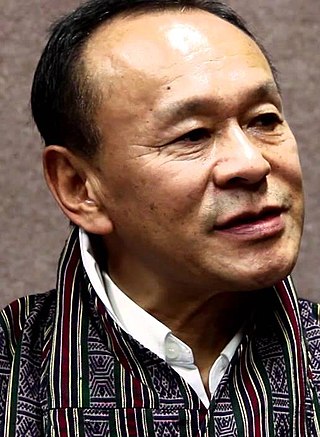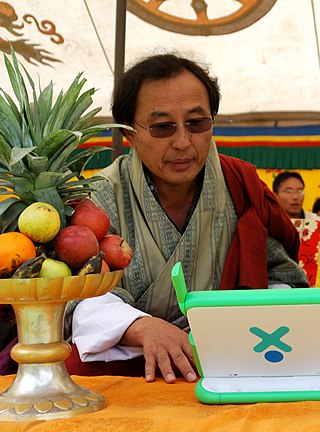Related Research Articles

The Lhotshampa or Lhotsampa people are a heterogeneous Bhutanese people of Nepali descent. The Lhotshampa were estimated to comprise around 35% of the Bhutan's population by the U.S. Department of State as of 2008. The Lhotshampa are predominantly Hindu and Buddhist too,who speak the Nepali language.

Thimphu is the capital and largest city of Bhutan. It is situated in the western central part of Bhutan,and the surrounding valley is one of Bhutan's dzongkhags,the Thimphu District. The ancient capital city of Punakha was replaced by Thimphu as capital in 1955,and in 1961 Thimphu was declared as the capital of the Kingdom of Bhutan by the 3rd Druk Gyalpo Jigme Dorji Wangchuck.

Jigme Singye Wangchuck is a member of the House of Wangchuck who was the king of Bhutan from 1972 until his abdication in 2006.

Lyonpo Jigme Yoser Thinley is a Bhutanese politician who was Prime Minister of Bhutan from 20 July 1998 to 9 July 1999,30 August 2003 to 18 August 2004 and 9 April 2008 to 28 April 2013.

Jigme Dorji Wangchuck was the 3rd Druk Gyalpo of Bhutan.

Gross National Happiness,sometimes called Gross Domestic Happiness (GDH),is a philosophy that guides the government of Bhutan. It includes an index which is used to measure the collective happiness and well-being of a population. Gross National Happiness Index is instituted as the goal of the government of Bhutan in the Constitution of Bhutan,enacted on 18 July 2008.
Articles related to Bhutan include:

Bhutan,officially the Kingdom of Bhutan,is a landlocked country in South Asia situated in the Eastern Himalayas between China in the north and India in the south,with the Indian state of Sikkim separating it from neighbouring Nepal. With a population of over 727,145 and a territory of 38,394 square kilometres (14,824 sq mi),Bhutan ranks 133rd in land area and 160th in population. Bhutan is a constitutional monarchy with a Druk Gyalpo (king) as the head of state and a prime minister as the head of government. The Je Khenpo is the head of the state religion,Vajrayana Buddhism.

Rinpung Dzong,sometimes referred to as Paro Dzong,is a large dzong - Buddhist monastery and fortress - of the Drukpa Lineage of the Kagyu school in Paro District,Bhutan. It houses the district Monastic Body as well as government administrative offices of Paro Dzongkhag. It is listed as a tentative site in Bhutan's Tentative List for UNESCO inclusion.
Princess AshiKesang Choden Wangchuck,is a member of the royal family of Bhutan. She is a daughter of the fourth King of Bhutan Jigme Singye Wangchuck and Queen Mother Ashi Tshering Pem Wangchuck,one of the former king's four wives,all of whom are sisters and held the title 'queen consort'. She is a half-sister of the current Druk Gyalpo Jigme Khesar Namgyel Wangchuck,who became king following the abdication of his father Jigme Singye Wangchuck on 9 December 2006.
The development of Bhutanese democracy has been marked by the active encouragement and participation of reigning Bhutanese monarchs since the 1950s,beginning with legal reforms such as the abolition of slavery,and culminating in the enactment of Bhutan's Constitution. The first democratic elections in Bhutan began in 2007,and all levels of government had been democratically elected by 2011. These elections included Bhutan's first ever partisan National Assembly election. Democratization in Bhutan has been marred somewhat by the intervening large-scale expulsion and flight of Bhutanese refugees during the 1990s;the subject remains somewhat taboo in Bhutanese politics. Bhutan was ranked 13th most electoral democratic country in Asia according to V-Dem Democracy indices in 2023 with a score of 0.535 out of 1.

The following outline is provided as an overview of and topical guide to Bhutan:

Dasho Kinley Dorji was Bhutan's first trained journalist who became founder,then managing director and editor in chief of Kuensel, Bhutan's national newspaper. In 2009 he became Secretary of the Ministry of Information and Communications,a position he held until 2016.
Human rights in Bhutan are those outlined in Article 7 of its Constitution. The Royal Government of Bhutan has affirmed its commitment to the "enjoyment of all human rights" as integral to the achievement of 'gross national happiness' (GNH);the unique principle which Bhutan strives for,as opposed to fiscally based measures such as GDP.

Tshering Tobgay is a Bhutanese politician,environmentalist,and cultural advocate who is the Prime Minister of Bhutan since 28 January 2024 and also served in office from July 2013 to August 2018. Tobgay is the leader of the People's Democratic Party,and was also the Leader of the Opposition in the National Assembly from March 2008 to April 2013.
Although for many decades,it was customary to focus on GDP and other measures of national income,there has been growing interest in developing broad measures of economic well-being. National and international approaches include the Beyond GDP programme developed by the European Union,the Better Lives Compendium of Indicators developed by the OECD,as well as many alternative metrics of wellbeing or happiness. One of the earliest attempts to develop such an index at national level was Bhutan's Gross National Happiness Index and there are a now a number of similar projects ongoing around the world,including a project to develop for the UK an assessment of national well-being,commissioned by the Prime Minister David Cameron and led by the Office for National Statistics.
Med Jones is an American economist. He is the president of International Institute of Management,a U.S. based research organization. His work at the institute focuses on economic,investment,and business strategies.
Gross National Well-being (GNW),also known as Gross National Wellness,is a socioeconomic development and measurement framework. The GNW Index consists of seven dimensions:economic,environmental,physical,mental,work,social,and political. Most wellness areas include both subjective results and objective data.
Dorji Yangki is one of the first female architects from Bhutan.

The Bhutan Centre for Media and Democracy (BCMD) is the first Civil Society Organisation in Bhutan. It was launched in 2008 coinciding with the country's first government elections,which heralded a new era of self-governance following the abdication of the fourth king of Bhutan,Jigme Singye Wangchuck. At the same time,the media landscape saw the arrival of new private newspapers and radio stations,as well as social media via mobile telephones and the Internet. The stated mission of BCMD is to "nurture democracy in Bhutan through civic engagement,public discourse and media literate citizens".
References
Citations
- 1 2 Schuelka & Maxwell 2016, p. 64.
- ↑ Chitra & Gurung 2021, p. 2.
- 1 2 Schuelka & Maxwell 2016, p. 244.
- ↑ Schuelka & Maxwell 2016, p. 11.
- 1 2 3 Mathew 2008, p. 31.
- ↑ Schuelka & Maxwell 2016, p. 9, 64.
- ↑ Young 2012, p. 17.
- ↑ Sherab, Maxwell & Cooksey 2015, p. 8.
- ↑ Sherab, Maxwell & Cooksey 2015, p. 70.
- ↑ Thinley 2014, p. 97.
- ↑ Chitra & Gurung 2021, p. 1.
- ↑ Schuelka & Maxwell 2016, p. 244-45.
Bibliography
- Chitra, S.; Gurung, Munna (2021). "The Concept of Green Schoolin Bhutan for Holistic Education and Development" (PDF). Rupkatha Journal on Interdisciplinary Studies in Humanities. 13 (3): 1–13. doi:10.21659/rupkatha.v13n3.03 . Retrieved 6 September 2022.
- Mathew, Joseph C. (2008). "Bhutan: 'Democracy' from Above". Economic and Political Weekly. 43 (19): 29–31. Retrieved 6 September 2022.
- Schuelka, Matthew J.; Maxwell, T.W. (2016). Education in Bhutan: Culture, Schooling, and Gross National Happiness. Springer. ISBN 978-981-10-1647-9.
- Sherab, Kezang; Maxwell, T.W.; Cooksey, Ray (2015). "Congruency and comparisons of the vision and mission statements across four case study schools" (PDF). Bhutan Journal of Research & Development. 5 (1): 69–79. Retrieved 6 September 2022.
- Thinley, Dorji (2014). "Cultural Continuity and School Education in Bhutan: Current Initiatives, Challenges and Opportunities" (PDF). Journal of Indian Research. 2 (2): 95–102. Retrieved 6 September 2022.
- Young, Deborah (2012). "The Role of Critical Pedagogy in Enhancing the Values and Principles of Gross National Happiness in the Royal University of Bhutan". Bhutan Journal of Research and Development. 1 (1): 13–22. Retrieved 6 September 2022.